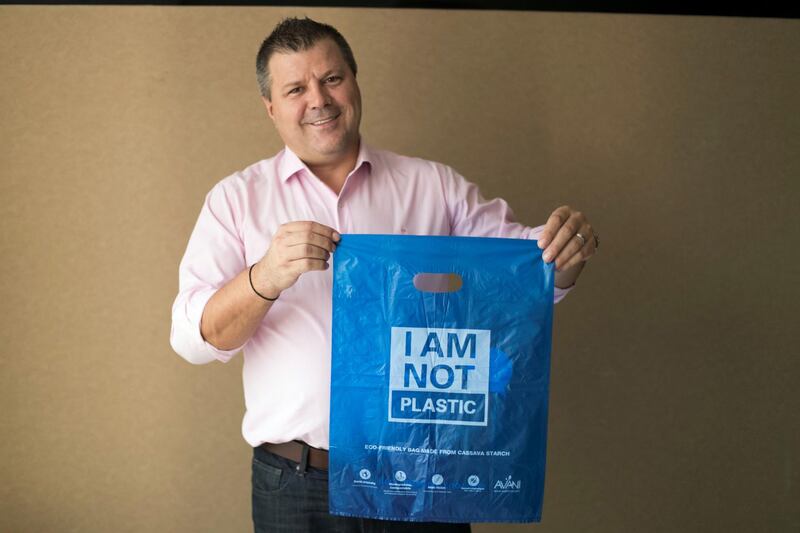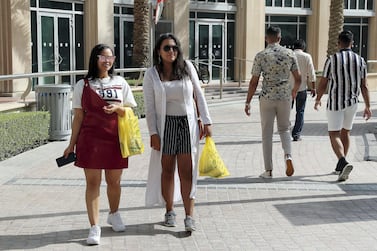The tide is turning in the battle against single-use plastic in the UAE, businesses in the country have claimed.
Hotels, restaurants and supermarkets are among firms across the Emirates now actively seeking to reduce their environmental footprint.
In recent years, companies have found themselves under increasing pressure from more discerning consumers demanding they act more responsibly.
Plastic bag use in particular has drawn the ire of many, with large numbers of shoppers in the Middle East and around the world calling for their ban.
“There has been a massive change in mindset towards single-use plastics in the UAE and it is coming from the customers,” said Peter Avram, 46, managing director of Avani, a company founded to help fight the "global epidemic of plastic pollution".
“What you are seeing is a campaign from people here in the UAE. It’s crazy to see just how strongly people feel about removing them.”
Avani first began operating in Indonesia in 2014 in response to a growing demand for more eco-friendly products.
The company manufactures a range of compostable bioplastic goods and packaging, including cornstarch coffee cups and straws, wooden cutlery and bags made from the root vegetable Cassava.
Last year, the firm set up its first office in the Middle East in Dubai as it sought to expand its operations globally.
Today, more than 150 companies including Virgin Megastores, Deliveroo and Spinneys Dubai rely on its more sustainable alternatives to plastic products.
“People are more concerned than ever before about the impact of plastics on the environment,” said Mr Avram.
“It's the younger generation who are demanding that something is done about it. The people who need to change their attitudes are the older generations who might be a little stuck in their ways.
“There are a lot of supermarkets [in the region] approaching us.”
Mr Avram revealed how Avani’s shopping bags were designed with a zero tolerance attitude towards using petroleum-based plastic.
Made from Cassava - grown across the developing world as a source of carbohydrate - the vegetable is first pulped and dried before vegetable oil is added to act as a binding agent.
Following that, the mixture is melted before being blown into a thin, film-like material which the bags are made from. Even the writing on the product is eco-friendly, with the ink being manufactured from soybean.
"They lооk, feel and perform like plastic but are made from Cassava rооt and natural resins,” said Mr Avram, who pointed out that some plastic bags take hundreds of years to decompose.
“They are 100 per cent compostable, unlike other biodegradable alternatives.”
Experts recognise that countering plastic pollution represents a huge global challenge, but one which consumers and manufacturers are increasingly waking up to.
An estimated 8.3 billion tonnes of plastic pollution has been produced since the 1950s, according to US academics, and last year a United Nations conference reported plastic was responsible for the deaths of more than 1.1 million animals and seabirds each year.
Charging customers for plastic bags has been one recent development in the fight to reduce their use, and Mr Avram claimed evidence suggested the idea was working.
A trial adopted by Waitrose in Abu Dhabi in 2018 - where shoppers were charged Dh0.05 per plastic bag - led to a 74 per cent reduction in their purchase.
It is not just supermarkets in the UAE who are now keen to demonstrate their efforts to tackle the menace of single-use plastic, however. A number of hotel chains have also announced policies to drastically reduce their use.
This week, the Hilton group said it had successfully fulfilled its promise to eliminate all plastic straws and bottles from its 25 hotels in the country.
“We are driven by our belief that this is simply the right thing to be doing,” said William Costley, Hilton’s vice president in the Arabian Peninsula region.
“[We] also believe that over the long run there is an opportunity to actually make savings through re-usable materials, replacing some plastic items.”
The Radisson Hotel Group also said it was taking steps to eliminate the use of plastic.
“Plastic straws have been taken out of restaurants and bars and have been replaced by paper straws, and even pasta ones in some cases,” said spokesman Xavier Halbi.
Meanwhile, luxury hotel Jumeirah at Saadiyat Island has moved to ban single-use plastic throughout its resort.
Guests are even given reusable water bottles at check-in to cut down on waste and and on-site water filtration system ensures the hotels avoids buying in water in plastic containers.








